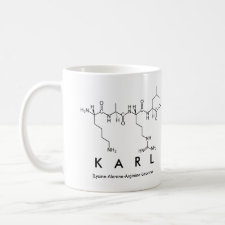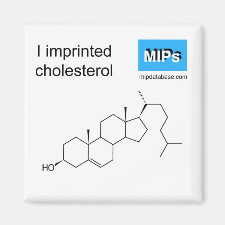
Authors: Sellergren B, Wieschemeyer J, Boos KS, Seidel D
Article Title: Imprinted polymers for selective adsorption of cholesterol from gastrointestinal fluids.
Publication date: 1998
Journal: Chemistry of Materials
Volume: 10
Issue: (12)
Page numbers: 4037-4046.
DOI: 10.1021/cm980730u
Abstract: A series of highly cross-linked terpolymers of methacryloylated cholesterol or bile acid methyl esters, methacrylic acid, and ethyleneglycol dimethacrylate were prepared in the presence or absence of cholesterol acting as a template molecule. The polymers were freed from cholesterol by washing and the resulting adsorbents tested for cholesterol rebinding in the chromatographic mode using methanol-water as mobile phase or in the batch mode using an intestinal mimicking fluid of concentrated bile acids in water. The polymers prepared in polar solvents, favoring the apolar association of the template and the apolar face of the amphiphilic monomers, exhibited selective rebinding of cholesterol as compared to a nonimprinted blank polymer prepared identically but without cholesterol. The strongest rebinding was seen for the polymer prepared using 3 beta-methacryloyl-cholesterol as the functional monomer; Using a physiologically relevant intestinal-mimicking solution of cholesterol(1 mM), these polymers adsorbed ca. 17 mg cholesterol per gram dry adsorbent, whereas a nonimprinted blank polymer adsorbed ca. 13 mg. The imprinted polymers showed the highest uptake of cholesterol as compared to other adsorbents (<13 mg/g) that were expected to show high affinity for cholesterol



Join the Society for Molecular Imprinting

New items RSS feed
Sign-up for e-mail updates:
Choose between receiving an occasional newsletter or more frequent e-mail alerts.
Click here to go to the sign-up page.
Is your name elemental or peptidic? Enter your name and find out by clicking either of the buttons below!
Other products you may like:
 MIPdatabase
MIPdatabase









